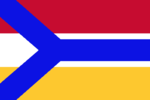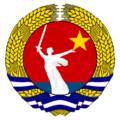Union of Nova-Occitania
This article refers to a micronation or element of micronationalism which is defunct and no longer exists. You can help make the article reflect that or ask on the talk page for further information. |
This article or section contains out-of-date information or information about an entity that is currently undergoing major changes. |
Not to be confused with Occitania, historical region in southern Europe and Occitanie, administrative region of the French Republic.
| 2019–2020 | |||||||||
| Motto: Casa dividida es casa perdida (Castilian) Divided house is a lost house | |||||||||
| Anthem: '"Chant des Partisans" (unofficial) | |||||||||
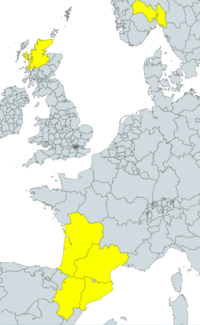 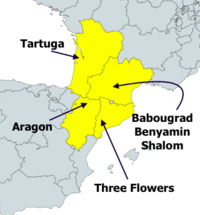 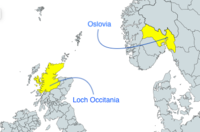 Location of the Union of Nova-Occitania | |||||||||
| Capital | Babougrad | ||||||||
| Largest city | Three Flowers | ||||||||
| Official languages | Afrikaans Catalan French Occitan | ||||||||
| Ethnic groups (2019) | Catalans 48.3% French 24.1% Spaniards 13.8% Latin Americans 6.9% Others 6.8% | ||||||||
| Demonym(s) | Occitanian, Nova-Occitanian | ||||||||
| Government | Federal semi-presidential republic | ||||||||
| Babou Chkaya (D) | |||||||||
| Ivanna Minaïeva (D) | |||||||||
| Legislature | Amassada | ||||||||
| Establishment | |||||||||
| History | |||||||||
• Popular Union of Occitania declared independence | 15 September 2015 | ||||||||
• Dissolution of the Popular Union of Occitania | 28 October 2018 | ||||||||
• Reestablishment of the Occitanian micronation | 28 July 2019 | ||||||||
• Established | 2019 | ||||||||
• Disestablished | 2020 | ||||||||
| Area | |||||||||
• Total | 2.086 km2 (0.805 sq mi) | ||||||||
• Water (%) | 0.68 % | ||||||||
| Population | |||||||||
• 2019 census | 23 | ||||||||
| Currency | Occitanian Diner (ODI) | ||||||||
| Time zone | Main Occitania UTC+01:00 | ||||||||
• Summer (DST) | Main Occitania | ||||||||
| Date format | yyyy.mm.dd | ||||||||
| Driving side | right | ||||||||
| GUM 3-letter code | OCC | ||||||||
| |||||||||
The Union of Nova-Occitania, more commonly known as Nova-Occitania, was a self-proclaimed state located all around Western Europe, in the Midi, Iberian Peninsula and British Isles. Nova-Occitania was established by a declaration of sovereignty as a successor state of the Popular Union of Occitania after it's dissolution in October 2018. After two more years of existence, the union was dissolved for a second time on June 23, 2020.
Etymology
Occitania is a mixture of two words. "Occ-", comes from the surname of the occitan language calls "lenga d'òc" (language of oc). "-itània" means "land of' in latin. 'Nova' is the feminine nominative singular of Latin novus (“new”).
History
Popular Union regime

The first Occitanian micronation was founded on September 15, 2015, as a communist-inspired regime by Babou Chkaya. It was in 2017 that micronation began a certain liberalization by opening up to the world through its diplomacy, notably by joining the GUM.
Starting from a simple territorial base in Western Europe, the Popular Union has experienced a vast territorial expansion by allowing the accession of territories throughout the northern hemisphere.
In early 2018, Juan Cisneros was elected president. However, the micronational process has not really changed under his presidency, marked in particular by the absence of Babou Chkaya. After numerous internal disagreements, notably with the new territories, it was decided to dissolve the federation. Two political structures were born after this dissolution, Tagtabazar, renamed Aswington and Nova-Occitania.
Re-creation of the Occitanian micronation
After the dissolution of the UPO, the territories acted autonomously. It was at the end of May that discussions began between several former leaders such as Babou Chkaya, Ivanna Minaïeva and Vicent Branchadell. They chose to write the declaration of sovereignty in order to re-create a micronation.
After setting up a Constitutional commission whose mission was to write a constitution, which was adopted by referendum, the Democratic Party ruled by winning all of the federal and local elections in 2019. This party had a prudent policy, prefer in the first place to write numerous internal laws, creating an intranet before engaging more actively in diplomacy.
After a full mandate, marked at the end by the coronavirus pandemic in Occitania, Babou Chkaya was reelected for a second mandate. During his victory speech he solemnly announced the end of the reconstruction period.
Age of development
Two symbolic standards opened this period, the end of the asymmetry of the federation, all the territories take the name of Viguerie[1] on March 22, while a new coat of arms was adopted the following day.[2] On May 12, 2020 Oslovia, former member of the Popular Union has return into the Union.[3]
Geography
The Union is made up of several enclaves located in various parts of Western Europe. The first group is located in the city of Toulouse in France where are located capital-city Babougrad, Benyamin and Shalom. The second group is located in the Sobrarbe region where the dependence of Aragon-Treserols is divided into 3 parts. Finally, Tartuga is located in the Gironde, Three Flowers in the Segria, Loch Occitania in the Glen Coe and Oslovia in the Oslo Graben.
Climate
The whole territory is considered to be temperate. However, there are local particularities such as the proximity of the ocean to Tartuga and a mountain climate in Aragon-Treserols.
Environment
A law provides that the two dependencies of Loch Occitania and Aragon-Treserols are considered as "priority areas for biodiversity". The Aragonese territory is particularly concerned insofar as numerous wild species, fauna and flora, are present and pass freely through the territory.
In December 2019 and under the leadership of the Democratic Party, a controversial law[4] on the environment and ecology was passed by the Amassada. This law imposes a certain number of restrictions such as the prohibition of hunting, fishing and capture of animals, the prohibition of circulation of thermic vehicles, the prohibition of dumping toxic products and the obligation of waste recycling.
This same law imposes public policies that the state must undertake, especially with regard to the preservation of local biodiversity. It poses duties and obligations to everyone with regard to this preservation.
Administrative divisions
The Union of Nova-Occitania is divided into 6 vigueries and 2 dependencies, all located in Europe.
The vigueries and dependencies are all known as territorial collectivities, meaning they can possess local assemblies as well as an executive.
Politics and government
Nova-Occitania is a federal, semi-presidential republic. The President of Occitania is elected by direct universal suffrage while the Prime Minister is the leader of the party with the most seats in Parliament, the Amassada. Together, they form a government. The President and the PM govern in a duet, each with its own prerogatives. In Occitania, there are two sources of laws, in the first place the Constitution which was voted by the people in a referendum. The other is named Codex Premius, a compilation of all the federal laws of Occitania. The federal elements could also have their own local Codex.
Politics
Currently, three parties are active in Nova Occitania. First, the Democratic Party from which the government as a whole came, like the President and the Prime Minister. He is classified as Social Democrat and it is the only one to have representation at the federal level.
Montserrat is a local party in the Republic of Three Flowers, considered to be far left. Its leaders were previously in the Convergence and Will party, but they separated from it. This old party subsequently changed its name to the Democratic Party. Montserrat does not have a position of responsibility at the federal level, only two deputies, from Three Flowers.
Finally, the Civic Unity Party is the third active political group, nevertheless it seems to be inactive and has never postponed a single election or a position of responsibility.
| Party Name | Emblem | Leader(s) | Position | Seats in the Amassada | Local heads [5] |
|---|---|---|---|---|---|
| Democratic Party (D) |  |
Babou Chkaya | Left-wing | 4 / 6 |
4 / 7
|
| Montserrat (MON) | Vicent Branchadell | Anti-capitalism | 2 / 6 |
2 / 7
| |
| Civic Unity Party (CUP) | Juan Cisneros | Centre-left | 0 / 6 |
0 / 7
|
Government
The government of the Union is a reflection of the parliamentary majority. Thus the Prime Minister must be invested by a majority of votes by the assembly.
At the level of competences, the powers of ministers come by delegation from the President of the Union. Indeed, it is considered that the latter has all of the executive powers while the Prime Minister has legislative legitimacy. All of these two sources of power are concentrated in government.
The first administration led by the Democratic Party created many ministries, focused on federalism (Ethnic Minorities, Territorial Cohesion) and social issues (Immigration, Solidarities).
Ministries
- Prime Minister of Occitania - Head of the government
- Agriculture - responsible for the production, marketing, processing and merchandising of agricultural products and food.
- Culture and Sports - in charge of national museums and monuments; promoting and protecting the arts (visual, plastic, theatrical, musical, dance, architectural, literary, televisual and cinematographic) in Nova-Occitania and abroad; and managing the national archives.
- Diplomacy and Commonwealth - is responsible of the diplomacy and international discussions and negotiations.
- Environment - is responsible for the protection of the environment.
- Ethnic Minorities - is responsible for the promotion of all the ethnic minorities of Nova-Occitania, as well as the respect of their rights.
- Immigration - is in charge of the naturalization process and recruitment campaigns.
- Konstitusievoog - is responsible of the application of the constitution and the constitutionality of the laws voted.
- Media and Telecommunication - is responsible of the national telecommunication and public medias.
- Opposition - represents the main opposition party in the government, to guarantee the democracy in the country.
- Solidarities - is responsible for social action and the protection of women's rights.
- Territorial Cohesion - is responsible to maintain the union of all the territories of Nova-Occitania, to guarantee territorial equality and to control the action of local policies.
- Chief Mouser
Law and order
The Union chose a mixed legal regime between Anglo-Saxon law and Roman law. Indeed, even if all the texts are grouped in a codex in the manner of Roman law (Codex Premius), the form of the trial is of the accusatory type and is also based on case law as in all Anglo-Saxon countries.
Public law
The constitution of the Union is inspired in particular by the Constitution of Spain. The head of state takes over the sovereign functions by adding great political power. It is assumed that the latter has all the executive powers, delegating the prerogatives to the Prime Minister and to the government.
The Union is an asymmetrical federation, meaning that not all territories have the same status. As in Spain, the territories have a "Statute of Autonomy", fundamental text in each territory which defines as a local constitution its name, the name of its institution of government and finally its competences. Indeed, the constitution of the Union of Nova-Occitania lays down a list of prerogatives which are in principle under the federal jurisdiction but which the territories can assume by writing them in their statute of autonomy.
The Constitutional Court has the power to ban by a decision, a local or federal law which it considers to be unconstitutional.
Private law
Created by Napoleon Bonaparte and inspired by Roman law, the Union adopted the Code system to register its internal laws. Indeed, each federal law, established by decree of the Constitutional Commission, voted by the Amassada or by presidential decree is registered in this Code, which is divided into four sections (First laws, Criminal, Penal Procedure and Public Institutions).
In addition to federal laws, the heads of the territories can, by decree and in the competences registered in their Statute of Autonomy, lay down local laws. Federal laws may also, have a clause which gives them a so-called principle vocation, which the territories can adapt by decree.
The criminal procedure was modeled on the Anglo-Saxon model, unlike the inquisitorial model where the judge conducts investigations to bring the truth, here it is the police to conduct the investigation, the judge is not here that the person who can de facto judge and publish the sentencing.
Two police forces have a legal existence, firstly the Civil Guard which has jurisdiction in principle and finally the Environmental Police, created in December 2019 by law. Its purpose is to verbalize environmental damage.
E-noc
Very quickly after the re-creation of the Occitanian micronation, the authorities set up a website, qualified as an intranet, in order to collect all legal, local and federal texts. After having created a site on the xooit platform in June 2019, a new version of E-noc was implemented on miraheze in December of the same year.
Foreign relations
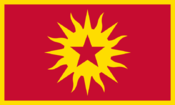
In the months after its refoundation, Nova-Occitania did not take steps to restore past diplomatic relations. Only five treaties were signed by the Ministry of International negotiations between July and December 2019, respectively with Aswington (former member of the UPO), Rino Island, Vancouver, Iustus and Arbreland.
At the level of international organizations, Nova-Occitania is member of its Commonwealth, the GUM and the Konmalehth
At the level of international politics, Nova-Occitania's diplomacy regularly issues press releases. The Union notably defended the former Bolivian president Evo Morales, as well as the Catalan independence movement.
Military
The only legal reference to armies is made in the Constitution where it is stated that the head of state is the head of the armies. However, the military has not been established or received a budget.
Government finance
A budget can be voted by the assembly. The problem being that the only resource of the state being monetary production, it is appropriate for the government to manage inflation well.
The first two budgets were decided by the Constitutional Commission in June and July 2019.
Economy

Like the micronations or contemporary states, the primary sector is the main provider of employment and GDP. Indeed, Aragon-Treserols and Three Flowers are agricultural land, intended for export. The productions of Three Flowers are exported to a local cooperative while the production of Aragon-Treserols is destined for private buyers from the surrounding villages.
The majority of other citizens have a job in France or are students.
The Occitanian Diner is the official currency in the country, its value is indexed on aluminium stock princes. However, the majority of the people is using macro-currency such as the Euro in their daily life.
Demographics
Population
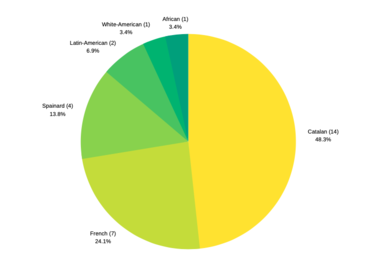
| Population | |||
|---|---|---|---|
| Year | Population | Citizens | |
| 2019 | 22 | 29 | |
The first census made by the novo-occitanain authorities was made in December 2019. It led to the following results, 22 people live in Nova-Occitania. However, it should be remembered that 7 people also have nationality, but they do not live on the territory.
In 2019, almost 50% of the inhabitants are from the Catalan community. The other major communities are the French (24%) and the Spaniards (14%) . The smallest minorities are Latin Americans (7%), White Americans and Africans (3.4% both).
The Nova Occitania government has a clear policy and promotes integration and naturalization of foreigners,[6] by creating in particular a Ministry of Immigration.
Languages
In matters of official language, the constitution of the Union of Nova-Occitania indicates that if a language is official at the local level, it becomes so at the federal level. In addition, all andemic languages are recognized.
The most spoken language is Catalan, more than 50% of the inhabitants know how to speak it and this beyond Three Flowers. However, almost all of the official documents are written in French and the language of communication remains English.
Culture and media
Religion
The state remains silent on a possible affiliation with a religion. It recognizes freedom of thought and religion but does not recognize a religion as national or official. At the local level, the viguerie of Shalom recognizes itself as "Jewish", without specifying whether this refers to the Jewish people or to the Jewish religion.
From a quantitative point of view, the majority of the inhabitants are Catholic (especially in Three Flowers) or without religion. A small Jewish community exists in Shalom and Benyamin.
Media
Two media are currently active in Nova-Occitania. First, an information website called ONN. Subsequently, a web television TV OC, which broadcasts steaming programs on YouTube but also has a live television platform on internet which is active irregularly. These two media were already active under the former political regime of the Popular union.
Music
Every year since 2018, the Occitavision competition is organized by TV OC in cooperation with the Ministry of Culture and Sports.
The purpose of the contest is to preselect a song for the Microvision Song Festival contest. Each territory chooses an artist bringing a local musical tradition which enters into competition.
Sport
Since its refoundation, Nova-Occitania has bet on the sport to make itself known. By a decree-law, an Olympic committee has been created who manages many federations like in football or checkers). In addition, eight e-venues have been created to host future sports events.
The most popular sport in Nova Occitania is checkers. In this sense, the Nova-Occitanian Olympic Committee was elected to organize the next MOF Checkers Tournament.
See also
References
- ↑ " DECREE-LAW of the 22 march 2020", Codex Premius on e-NOC, Retrieved 23 March 2020
- ↑ " PRESIDENTIAL DECREE 2020/9", Presidential Decree on e-NOC, Retrieved 23 March 2020
- ↑ "Oslovia joins the Union of Nova-Occitania". ONN. 12 May 2020.
- ↑ " Law Ecologist Pack", Codex Premius on e-NOC, Retrieved 12 December 2019
- ↑ The Diet of Oslovia is vacant
- ↑ " Join Nova-Occitania", e-NOC, Retrieved 28 November 2019
External links
- Micronations
- Nova-Occitania
- Afrikaans-speaking regions
- Afrikaans-speaking micronations
- Spanish-speaking regions
- Spanish-speaking micronations
- French-speaking regions
- French-speaking micronations
- Catalan-speaking regions
- Catalan-speaking micronations
- Multilingual micronations
- Former Grand Unified Micronational member states
